

Claim Certain. Rootstrikers. Crowdsourcing vs Putin: “Mapping Dots is a Disease on the Map of Russia” I chose to focus my dissertation research on the impact of information and communication technologies (ICTs) during elections in repressive states.
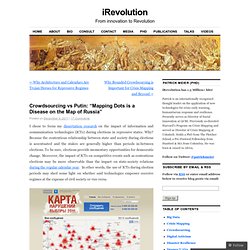
Why? Because the contentious relationship between state and society during elections is accentuated and the stakes are generally higher than periods in-between elections. To be sure, elections provide momentary opportunities for democratic change. Moreover, the impact of ICTs on competitive events such as contentious elections may be more observable than the impact on state-society relations during the regular calendar year. The first Congressional "hackathon" · digiphile. Open Knowledge Foundation Blog » Blog Archive » How to study lobbying with crowdsourced open data. The following guest post is from Regards Citoyens, a French organisation that promotes open data.
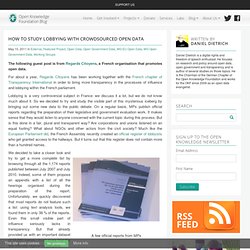
For about a year, Regards Citoyens has been working together with the French chapter of Transparency International in order to bring more transparency in the processes of influence and lobbying within the French parliament. Lobbying is a very controversial subject in France: we discuss it a lot, but we do not know much about it. So we decided to try and study the visible part of this mysterious iceberg by bringing out some new data to the public debate. On a regular basis, MPs publish official reports regarding the preparation of their legislative and government evaluation work.
World Map of Open Government Data Initiatives. Open Source Life: How the open movement will change everything. Consider this: in just a few short years, the open-source encyclopedia Wikipedia has made closed-source encyclopedias obsolete — both the hard-bound kind and the CD-ROM or commercial online kind.
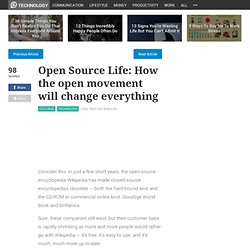
Goodbye World Book and Brittanica. Sure, these companies still exist, but their customer base is rapidly shrinking as more and more people would rather go with Wikipedia — it’s free, it’s easy to use, and it’s much, much more up-to-date. This is but one example of how the concept of open source has changed our lives already. Over the next 10 years or so, we’ll be seeing many more examples, and the effects could change just about every aspect of our lives. Philip Thigo (Sodnet) at Power of Information Conference. Open-source governance. Open-source governance is a political philosophy which advocates the application of the philosophies of the open source and open content movements to democratic principles in order to enable any interested citizen to add to the creation of policy, as with a wiki document.
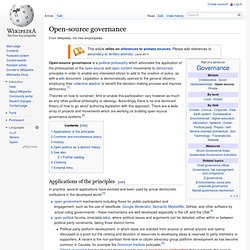
Legislation is democratically opened to the general citizenry, employing their collective wisdom to benefit the decision-making process and improve democracy.[1] Theories on how to constrain, limit or enable this participation vary however as much as any other political philosophy or ideology. Accordingly there is no one dominant theory of how to go about authoring legislation with this approach. There are a wide array of projects and movements which are working on building open-source governance systems.[2] Applications of the principles[edit] In practice, several applications have evolved and been used by actual democratic institutions in the developed world:[3] Common and simultaneous policy[edit] History[edit]
Government. Are we on the cusp of seeing dramatic changes in the way governments operate by publishing and consuming open data?
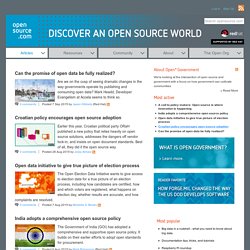
Mark Headd, Developer Evangelism at Accela seems to think so. Earlier this year, Croatian political party ORaH published a new policy that relies heavily on open source solutions, addresses the dangers off vendor lock-in, and insists on open document standards. Making Government Transparent and Accountable - SunlightFoundation.com.
Technology for Transparency Network. Educating 21st Century Citizens. Technologies pour la transparence : le rapport final. Le réseau Technologies pour la transparence est fier d'annoncer la publication de son rapport final, Cartographie mondiale de l'utilisation des nouvelles technologies pour plus de transparence et de responsabilisation [en anglais comme tous les liens, sauf mention contraire].
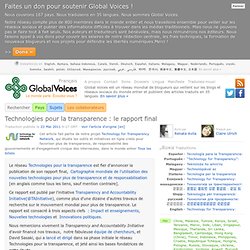
Global mapping of technology for transparency and accountability. As internet and mobile phone use increases, technology is transforming the field of transparency and accountability making it an increasingly dynamic space across the globe.
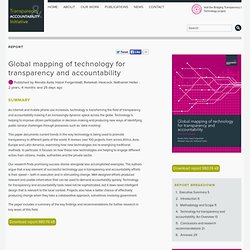
Technology is helping to improve citizen participation in decision-making and producing new ways of identifying public service challenges through processes such as ‘data mashing’. This paper documents current trends in the way technology is being used to promote transparency in different parts of the world. It reviews over 100 projects from across Africa, Asia, Europe and Latin America, examining how new technologies are re-energising traditional methods. In particular, it focuses on how these new technologies are helping to engage different actors from citizens, media, authorities and the private sector. A More Social Open Government. Earlier this week, Federal CTO Aneesh Chopra and OIRA Administrator Cass Sunstein jointly released an inquiry about the future of open government-- specifically, they asked for insight on three things: How can regulations.gov, one of the primary mechanisms for government transparency and public participation, be made more useful to the public rulemaking process?
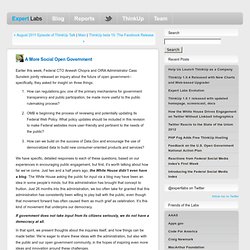
OMB is beginning the process of reviewing and potentially updating its Federal Web Policy. What policy updates should be included in this revision to make Federal websites more user-friendly and pertinent to the needs of the public? Sosolimited - reConstitution [Profile, Events, c++] - 'Playing on the immediacy of live media' /@sosolimited. Sosolimited is an art and design consultancy formed in 2003.
![Sosolimited - reConstitution [Profile, Events, c++] - 'Playing on the immediacy of live media' /@sosolimited](http://cdn.pearltrees.com/s/pic/th/sosolimited-reconstitution-14246464)
The group specialises in interactive installation and audiovisual performance. Peer-to-Peer Governance, Democracy And Economic Vision: P2P As A Way Of Living - Part 2. Pour un gouvernement 2.0. Liquid Democracy. Mob rule: Iceland crowdsources its next constitution. The new constitution will include checks and responsibilities for Iceland's parliament (the althing).
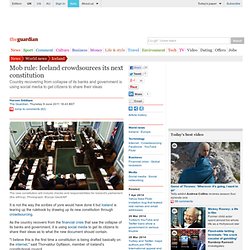
Photograph: Brynjar Gauti/AP It is not the way the scribes of yore would have done it but Iceland is tearing up the rulebook by drawing up its new constitution through crowdsourcing. As the country recovers from the financial crisis that saw the collapse of its banks and government, it is using social media to get its citizens to share their ideas as to what the new document should contain. "I believe this is the first time a constitution is being drafted basically on the internet," said Thorvaldur Gylfason, member of Iceland's constitutional council. Get Money Out. Twitter. Bologna's Second Attack with Pepper Spray. Sergeant Pepper Spray Will Be Investigated! Kudos to Daily Kos & Kossack Grapski! The video of Lieutenant Bologna's violence has gone viral. Kossack Charlie Grapski's terrific stop-motion frame by frame photographs derived from the captured video footage have proven to be a very powerful testimonial about a cop who is out of control, delivering blows through the message of anger, spraying violence through the medium of power.
Well, it seems that we Kossacks have some impact in the world... The Guardian's News Blog headline declares: We the Net. UK Citizens Online Democracy. Ugatuzi. Our projects. Pierre LEVY " cyberdémocratie", Odile Jacob, 2003. Sociologie démocratie électronique. L’auteur revient d’abord sur les critiques qui ont été portées à son œuvre depuis plusieurs années, en particulier sa notion « d’intelligence collective » dont Internet porterait les promesses au niveau planétaire et qui peut se comprendre comme un « socio-biologisme » : « Lorsque je parle de sélection au cours de l’évolution culturelle, je ne prétends nullement tel ou tel pouvoir momentané. Je suggère que des formes d’organisation sociale dans lesquelles les individus sont plus libres - et donc mieux capables d’actualiser leur potentiel - et dans lesquelles les procédures et les outils de coopération intellectuelle sont plus efficaces ont un avantage compétitif sur les sociétés dans lesquelles les gens sont opprimés (ou les singularités étouffées) et la coopération intellectuelle découragée ou faiblement outillée.
Autrement dit, le perfectionnement de l’intelligence collective (qui suppose la liberté) est le produit et le sens de l’évolution culturelle » p.16. Pour l'intelligence collective, par Pierre Lévy. FACE à l’irruption des nouvelles technologies de la communication et de l’information, certains penseurs mettent en garde contre les dérives et les dangers que cela suppose pour la démocratie. D’autres, comme l’auteur de l’article ci-dessous, y voient, au contraire, l’occasion d’un nouvel élan pour la participation civique des citoyens. A Tale of Two UI's: Tunisia Goes Open-Source, Hungary Uses iPad for New Constitution. A New Constitution for Tunisia. Meanwhile, Back in Tunisia, They're Drafting a Constitution on PiratePad. Well, not exactly. But we keep seeing hints and signs that the revolutionary spirit of Tunisia is heavily influenced by open source culture, or what BoingBoing might call "happy mutant" thinking.
To wit, on March 4th, Tunisia's new Minister of Youth and Sports Slim Amamou, who is better known as an activist blogger who has been deeply involved in the democracy movement there, tweeted: "Modifions collaborativement la constitution. On va voir ce que ça donne or "Let's collaboratively change the Constitution. We'll see what happens" with a link to a PiratePad page, an open collaborative editing tool. Judging from the chat thread that emerged on that Piratepad, one very tough issue emerged--whether a new Constitution for Tunisia could exclude references to Islam as the religion of the country, or to God. Constitution - Open Tunisia. Tackling "techno-utopianism" in Doha. Human Rights Watch put out a statement yesterday calling for the Egyptian government to drop charges against a blogger, Amr Gharbeia, accused of what the organization calls "bogus" crimes. Those sorts of press releases are remarkably common: Over the last 12 months, HRW has called for the release of bloggers and online activists from Vietnam, Syria, Iran, and dozens of other countries.
New media - particularly blogs and, more recently, Twitter - have certainly helped to revolutionize political speech. OpenTunisia. Egypt: Libertarian Socialist Movement. We libertarian socialists struggle for a socialist society without classes, an anti-authoritarian society free of the repressive apparatus of the State and of Capital. We stand against the introduction of State capitalism, such as in the oppressive regimes that existed in "socialist" countries. We reject and oppose the capitalist system.
[العربية ] The Libertarian Socialist Movement was founded on 23 May 2011 in Cairo, at the heart of the Egyptian Revolution and in the midst of the revolutionary wave that is sweeping over the world today, from Tunisia through Egypt, Libya, Yemen and Syria and even reaching Spain, bringing back memories of the waves in 1848 and 1968. Espagne Labs: inventer la démocratie du futur. Des assemblées numériques reliées entre elles, un réseau social alternatif, des outils open source et des licences libres en support, le tout coordonné au niveau technique par des hackers. Les acampadas du 15M se préparent à la globalisation du mouvement. Ne croyez pas que le mouvement espagnol s’étiole, bien au contraire !
Les propositions de ¡Democracia Real Ya! Le mouvement ¡Democracia Real Ya! Bright Neighbor Blog. 25 Ordinary Citizens Write Iceland’s New Constitution With Help From Social Media. The newest government in the world was designed with help from comments on the internet. Democracy (TM) — Coming to a Corporate Welfare State Near You. Are Cameras the New Guns? La révolution est en marche ! Silencieusement, une page de l'histoire de PHP vient de se tourner. En effet, il y a quelques jours, la RFC définissant les règles de gestion du processus de release de PHP avait été acceptée par la communauté des contributeurs, ainsi que celle régissant le processus de vote permettant à la communauté d'accepter ou de refuser l'ajout ou la modification de fonctionnalités au langage. Et hier, Stanislav Malyshev, l'un des deux Release Manager de PHP 5.4, a lancé le premier vote suivant ces nouvelles règles.
Pour la première fois dans l'histoire du langage, les développeurs de PHP ainsi que ses utilisateurs sont donc invités à faire un choix concernant l'avenir du langage à l'aide du suffrage universel. D'ailleurs, ce n'est pas un choix, mais bien plusieurs, que nous sommes invités à faire, et le symbole est d'autant plus fort que l'issue du vote aura un impact direct sur PHP 5.4, puisque ce vote concerne les fonctionnalités susceptibles d'être ajoutées au langage avec cette version.